
Topics
Guests
- Michael Stumofather of Samya Stumo, who was killed in the Ethiopian Airlines crash of March 2019.
- Rory Kennedyaward-winning documentary filmmaker.
Families of passengers who died in fatal crashes while aboard Boeing 737 MAX jets in Ethiopia and Indonesia are urging the Department of Justice to reopen a Trump-era settlement that allowed the company to evade criminal prosecution. We speak with the father of one of the victims, as well as the director of the new documentary, “Downfall: The Case Against Boeing,” which details Boeing’s push for profit over safety and is set to air on Netflix February 18. “We ultimately want this agreement reopened so that our input is reflected and it’s not a hasty rush job at the end of an administration,” says Michael Stumo, father of Ethiopian Airlines crash victim Samya Stumo, who recently met with Attorney General Merrick Garland. Boeing kept the planes running to save money despite internal research showing that their designs had a high probability to cause a crash. “They blamed the pilots, even knowing the system was faulty on this aircraft,” says filmmaker Rory Kennedy.
Transcript
AMY GOODMAN: This is Democracy Now!, democracynow.org, The War and Peace Report. I’m Amy Goodman.
Relatives of passengers who died in a pair of fatal crashes of Boeing 737 MAX jets in Ethiopia and Indonesia are urging Attorney General Merrick Garland to reopen a $2.5 billion settlement that the Trump administration reached with Boeing in its final days in office last year. Under the settlement, Boeing avoids criminal prosecution over its role in two of the deadliest airplane crashes in years. Attorney General Garland held a video meeting with several family members Wednesday.
The first crash occurred on October 29, 2018, when a Lion Air flight in Indonesia crashed after taking off from Jakarta, killing all 189 people aboard. Just after five months later, on March 10, 2019, an Ethiopian Airlines flight crashed minutes after taking off from Addis Ababa. A hundred fifty-seven people died — everyone on board. Both planes were using a new, flawed automated flight control system that activated erroneously.
The story of the Boeing crashes and the company’s push for profit over safety are told in a stunning new documentary called Downfall: The Case Against Boeing. It just premiered at the Sundance Film Festival. This is an excerpt featuring Garima Sethi, the wife of Bhavye Suneja, who died in the crash of Lion Air Flight 610 in Indonesia. He was the pilot.
GARIMA SETHI: My husband prepared his flight bag, checked his schedule, checked out with his colleague that he’s flying with. We had a meal and had a chat for 20, 30 minutes. That was the normal routine before he left for his flight. After he left, I went back to sleep. And after a few hours, I was expecting a call from him. You know, just a normal working day.
AIR TRAFFIC CONTROL: Lion Inter 610 cleared for takeoff, runway 2-5 left.
CO-PILOT: Lion Inter 610 cleared for takeoff, 2-5 left.
WARNING SYSTEM: Airspeed low. Airspeed low.
CO-PILOT: Indicated airspeed disagree, Captain.
WARNING SYSTEM: Airspeed low. Airspeed low.
CO-PILOT: Feel differential.
WARNING SYSTEM: Bank angle. Bank angle. Bank angle.
CO-PILOT: Altitude disagree, Captain!
AIR TRAFFIC CONTROL: Lion Inter 610?
CO-PILOT: We have a flight control problem!
WARNING SYSTEM: Pull up. Pull up.
CO-PILOT: Fly up! Fly up!
GARIMA SETHI: I got a call from one of his colleagues: “We are not able to find his aircraft.” I’m like, “Don’t worry,” because I knew — I knew my husband. I knew how he flew. I was just expecting a call from him, you know? I reached. That was the norm that we used to follow. So I was expecting that call from him instead of anyone else. And after that, it’s just been — everyone knows.
AMY GOODMAN: That was Garima Sethi, the wife of the Indonesian pilot in the Lion Air flight that went down in 2018. And that excerpt is from the upcoming Netflix documentary Downfall: The Case Against Boeing.
We’re joined now by two guests: the film’s director and producer, Rory Kennedy — she’s an Academy Award-nominated, Emmy Award-winning documentary filmmaker — and Michael Stumo, who is the father of Samya Stumo, who died in the Ethiopian Airlines crash in March of 2019, not six months after the Indonesian flight.
Michael, I want to begin with you, and I wanted to start off by sharing all of our condolences on the death of Samya, who I had gotten a chance to meet when she was alive, a beautiful young activist committed to social change. I wanted to give my condolences to your family. We had spoken with Ralph Nader, her granduncle, at the time, but I haven’t spoken to you and to your wife Nadia. Thank you for joining us.
MICHAEL STUMO: Thanks for letting me be here.
AMY GOODMAN: So, Michael, you just met with Merrick Garland, the attorney general. Before we talk about this really stunning documentary, I wanted to ask you about this latest news, what you are calling for.
MICHAEL STUMO: The criminal settlement, the deferred prosecution agreement with Boeing in the latter days of the Trump administration after Attorney General Barr had left, caused surprise, anger and grief among all the crash families, who are connected in a WhatsApp group globally, just erupted in anger. They never talked to us, despite me and my wife asking to speak to the DOJ a few months before. “Hey, what is going on in this criminal investigation?” They said — they denied there was an investigation. Everybody knew there was an investigation. They denied there was. We knew we had rights, under a law called the Crime Victims’ Rights Act, to meet and confer with prosecutors and have a say in their investigation, in their decisions. They said there wasn’t one. Then, all of a sudden, on January 1st, 2021, we find, oh, there’s a criminal settlement, a deferred prosecution agreement that immunizes Boeing executives and throws a couple pilots under the bus.
So, this challenge is by a law professor, Paul Cassell, who’s an expert in crime victims’ rights, and it alleges that the Crime Victims’ Rights Act was violated. We want to reopen the DPA. We don’t want Justice to fight us on that. It’s under new leadership with Merrick Garland. Garland has in fact fought for victims’ rights in a prior life, in the past, as a lawyer. And we asked that he agree with us, or at least not fight us on it, on asking that — a declaration that our rights were violated, and that we should have the opportunity to meet and confer. And, in fact, we ultimately want this agreement reopened, so that our input is reflected and it’s not a hasty rush job at the end of an administration.
AMY GOODMAN: And what’s your sense of the direction the attorney general will go? Again, to summarize, the Department of Justice has charged Boeing with criminal conspiracy to defraud the FAA, the Federal Aviation Administration. Boeing agreed to pay $2.5 billion in fines and compensations, but the arrangement allows the company to avoid criminal prosecution.
MICHAEL STUMO: Yeah, so, just one correction there: Boeing only paid $243.7 million in fines. The rest of it was mostly to airline customers that they had harmed, where they had to owe the money anyway because of the grounding. So they threw that money, plus a bit of some money to families, to make it look like a bigger settlement. It was only $243 million.
As expected in the meeting, Merrick Garland was very empathetic, very sincere. He listened carefully. We did not expect him to say which way he was going in the meeting, and he did not.
AMY GOODMAN: I want to bring Rory Kennedy into this conversation. This film is jaw-dropping. You go deep into Boeing’s history and, essentially, into the cover-up. Talk about why you decided to make Downfall: The Case Against Boeing and what you discovered as you investigated this.
RORY KENNEDY: Thank you, Amy. And I appreciate so much being on your show, being back here with you.
Like so many people, I followed this story, where we witnessed two airplanes crash within five months of each other, the same airplane, the 737 MAX. Three hundred and forty-six people lost their lives. And I wanted to know what happened. I wanted to know who knew what when, who was responsible for these planes crashing, for these lives lost. And I wanted to ultimately make a documentary where we could learn from those mistakes, hold those people accountable, and try our best to ensure that this doesn’t happen again.
AMY GOODMAN: So, take us through the two crashes. I mean, what was some of the most galling parts of this were the blame that Boeing placed on the pilots and also on the countries, as if to say, in developing countries, they just can’t handle quite our planes. Let me turn to another clip from the documentary Downfall: The Case Against Boeing, which premiered Friday at Sundance.
NEWS ANCHOR: An Ethiopian Airlines flight has crashed shortly after takeoff.
REP. PETER DEFAZIO: Two days after the second crash, we knew that this plane appeared to be defective in some manner.
GARIMA SETHI: It was their greed. Are the profits more important than the human life?
AMY GOODMAN: “It was their greed,” says Garima Sethi. And you also see in this clip Congressmember DeFazio, who led a deep investigation into what took place, the Oregon congressmember. But talk about, first, Lion Air and how Boeing responded, and then this unprecedented crash. Just months later, the same thing happens.
RORY KENNEDY: Yeah. Well, I mean, one of the things that was shocking to me to discover in the making of this film is that as far back as 2013, there are meeting minutes, that we document and are shown in the film, that show that Boeing was trying to hide the existence of the MCAS system to the FAA, to the regulators. The MCAS —
AMY GOODMAN: And explain MCAS, which no one knew, even the journalists — even the many technicians and FAA folks, even knew what MCAS was.
RORY KENNEDY: Well, worse than that, a lot of the pilots didn’t know what it was and that it was in the plane. So, the MCAS system was basically a computer system. This plane was built based on a model from — a 737 model that was built in the '60s. So, it was basically retrofitted with larger engines, because Boeing wanted to get to market faster and wanted to save money. So they retrofitted. They put these very large engines, and the aerodynamics of the plane didn't function properly in certain conditions. So, instead of rebuilding the plane, they, again, in an effort to save money, decided to rely on this system, a computer system, to fix the problem.
And basically, what this computer system did was push the nose of the plane downward. The problem — I mean, one of the many problems was that it relied on a single sensor, which is not consistent with regulations. You can’t have one sensor that could have a catastrophic impact. That sensor broke. It sent erroneous information to this computer system. And the nose of the plane kept pushing downward. Every 10 seconds, it would push downward. And in the first plane, that Lion Air airplane crash, they didn’t even know this system was on the plane.
We later find out, which was — equally just blew me away, that Boeing knew, based on their internal research, that if a pilot didn’t respond within four to 10 seconds of the system breaking down, that the result would be catastrophic. And catastrophic means that the airplane would crash, and everybody would die on it. So they knew that as far back as 2016, and they still put these planes up in the air.
And, as you point out, after that first Lion Air crash, they blamed the pilots, even knowing that it was the system that was faulty on this aircraft. So, it was, you know — I mean, you can imagine Garima, who we just heard from, not only having to deal the loss of her husband, and who had committed himself to really protecting his passengers and was an extraordinary pilot — to not only have to deal with his loss, but then to deal with this onslaught of press that suggested that her pilot husband was responsible for this.
AMY GOODMAN: And so, that was Lion Air. And they could get away with that for as long as there wasn’t the second crash, where the same thing happened. And in fact, these pilots, because of the first, though they weren’t trained in a simulator, they were alerted to this MCAS, which, as you said, pushed the nose of the plane down. You had to act within 10 seconds, turning off the system. They couldn’t deny it anymore, though it seemed like they were hiring more PR people, as you point out in the documentary, than they were dealing with how to take these planes out of service until they could figure it out.
RORY KENNEDY: Well, you know, the truth is, Amy — I mean, OK, so, between the first crash and the second crash, the other thing — you know, an additional memo and document is revealed in the film, which is a TARAM report. And the TARAM report showed that Boeing knew and the FAA knew that this plane had a likelihood of crashing 15 times over the course of its lifetime. So, that would average out as once every two years there would be a catastrophic crash like this. And they decided to keep the plane in the air, knowing that. That’s, to me, absolutely outrageous, I mean, to think that we are putting our children, our families, ourselves on these airplanes and that Boeing and the FAA would allow a plane like this to go back in the air, again, in the interest of saving money, because to ground the plane would cost Boeing millions and up to billions of dollars.
But still, after the second airplane crash — first of all, they kept it in the air for three days, until there were a number of other countries, including China and the European Union, that grounded the aircraft. We only did that after three days here in the United States. And Boeing still blamed the pilots after that second airplane crash.
AMY GOODMAN: Talking about their stupidity. I mean, the whole thing was incredible. But you also point out the corporate merger between Boeing and McDonnell Douglas played a key role.
RORY KENNEDY: Yes. This was back in the '90s. You know, I mean, Boeing is a company that I have huge respect for. It's been a driving force in our economy and really was on the forefront of pushing the envelope in commercial air, allowing us to be able to travel all over the world after World War II. You know, it was involved in getting the rockets up to the moon. So it’s had this extraordinary history and has really focused historically on engineering and excellence and safety.
And that all seemed to change when they merged with McDonnell Douglas. McDonnell Douglas was a flailing company, and somehow the people who worked at McDonnell Douglas ended up — you know, one person interview said they bought Boeing with Boeing’s money and somehow took charge of the company and really turned it into a company that prioritized profits over safety.
AMY GOODMAN: Michael Stumo, the organizing that the families of the plane victims did, what you did, going hearing after hearing to Washington, D.C., this international community, because one of the planes went down in Indonesia, one in Ethiopia, and the image of you standing behind the CEO of Boeing in one of those hearings, each of you holding the pictures of your loved ones. Talk about the organizing that has exposed so much of what Boeing did.
MICHAEL STUMO: The crash happened on March 10th of 2019. At the end of April, we learned that the FAA was planning to update pilot training for the MAX so that they received another hour of computer training. We knew then that the fix was in. They were trying to just do the minimal changes to get that MAX up in the air.
We were, you know, on the floor. I mean, we were just grieving. We’re trying to recover. And then we realized: We have to go to Washington. All the while, my wife Nadia and I were connecting with families, family members. Crash families were reaching out to each other, connected in a WhatsApp group, connected in other ways. And Nadia and I went to Washington and met with 56 different members of the Senate Commerce Committee and House Transportation Committee to tell —
AMY GOODMAN: We have 20 seconds.
MICHAEL STUMO: — our story every time. And the getting the families to Washington with the pictures, many times in front of the decision-makers, was difficult but important to let them know what was at stake.
AMY GOODMAN: And we will continue to follow the pressure you’re bringing on the attorney general and on Boeing, on what will come out of this horror that took place. Michael Stumo, father of Samya Stumo, who died in the Ethiopian Airlines crash, and Rory Kennedy, director of Downfall: The Case Against Boeing. I’m Amy Goodman. Thanks for joining us.

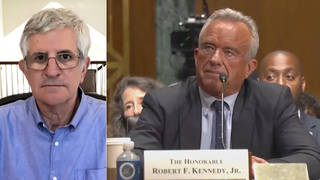
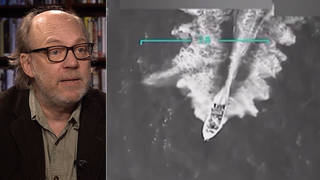
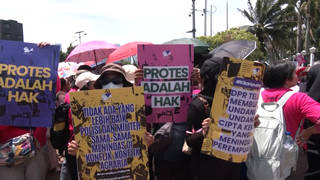
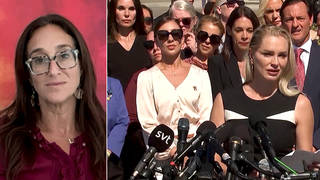





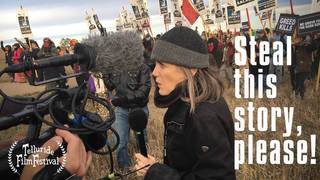
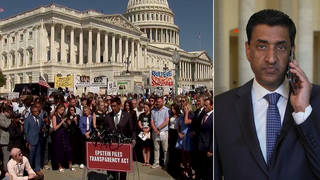
Media Options